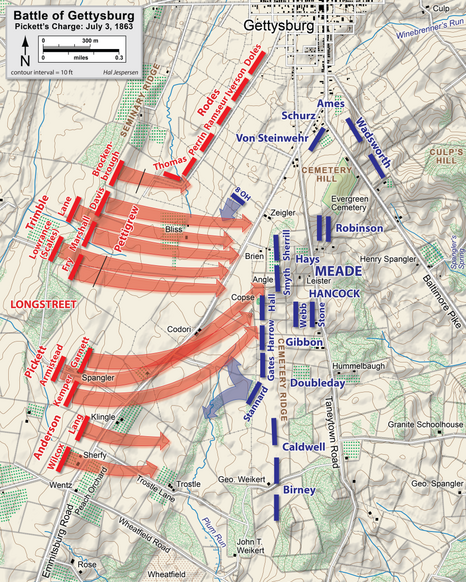Pickett's Charge
 •
by
•
by General Stonewall Jackson
Pickett's Charge was an infantry assault ordered by Confederate Gen. Robert E. Lee against Maj. Gen. George G. Meade's Union positions on Cemetery Ridge on July 3, 1863, the last day of the Battle of Gettysburg during the American Civil War. Its futility was predicted by the charge's commander, Lt. Gen. James Longstreet, and it was arguably an avoidable mistake from which the Southern war effort never fully recovered psychologically. The farthest point reached by the attack has been referred to as the high-water mark of the Confederacy.

The charge is named after Maj. Gen. George Pickett, one of three Confederate generals who led the assault under Longstreet.
After Confederate attacks on both Union flanks had failed the day and night before, Lee was determined to strike the Union center on the third day. On the night of July 2, General Meade correctly predicted at a council of war that Lee would try an attack on his lines in the center the following morning.
The infantry assault was preceded by a massive artillery bombardment that was meant to soften up the Union defense and silence its artillery, but was largely ineffective. Approximately 12,500 men in nine infantry brigades advanced over open fields for three-quarters of a mile under heavy Union artillery and rifle fire. Although some Confederates were able to breach the low stone wall that shielded many of the Union defenders, they could not maintain their hold and were repulsed with over 50% casualties, a decisive defeat that ended the three-day battle and Lee's campaign into Pennsylvania.

For every Southern boy fourteen years old, not once but whenever he wants it, there is the instant when it's still not yet two o'clock on that July afternoon in 1863, the brigades are in position behind the rail fence, the guns are laid and ready in the woods and the furled flags are already loosened to break out and Pickett himself with his long oiled ringlets and his hat in one hand probably and his sword in the other looking up the hill waiting for Longstreet to give the word and it's all in the balance, it hasn't happened yet, it hasn't even begun yet, it not only hasn't begun yet but there is still time for it not to begin against that position and those circumstances which made more men than Garnett and Kemper and Armistead and Wilcox look grave yet it's going to begin, we all know that, we have come too far with too much at stake and that moment doesn't need even a fourteen-year-old boy to think This time. Maybe this time with all this much to lose than all this much to gain: Pennsylvania, Maryland, the world, the golden dome of Washington itself to crown with desperate and unbelievable victory the desperate gamble, the cast made two years ago.


Comments
Udri me do zore XD
A cek, vec je zora XD hahah.. Prso mozak od ne spavanja xD
KRVVVV!!!!!
Aaa, polazio sam na posao, vartio se sa vrata i ipak upalio komp i udario poslednja 3 puta.
Joj sto mi je sad milo....
Napokon smer kuda treba da idemo i ton kakav treba da dominira ovom igrom.
Залутали метак решио мини битку... јеее :😁
idemoooooooooooooooooooooo
banzaiiiiiiiiiiiiiiiiiiiiiiiiiiiiiiiiiiiiiiiiiiiiiiii
😃DDDDDDDDD
" potko90 Day 1,220, 00:45
Aaa, polazio sam na posao, vartio se sa vrata i ipak upalio komp i udario poslednja 3 puta.
Joj sto mi je sad milo.... "
O tome ja pričam!
kakva je ovo demagogija, kao da ju je Gebels pisao
ipak ja mislim da je kljucni momenat bio ISTRA zavrsna runda u 04,02 tu smo prelomili kroasane i posle sve ide ko po loju 🙂
Vote !!!
Dominiraj!
Udarao pre fax-a 😁)
udri me ne daj me tvoja sam do zore i opet 🙂
😃 haha
v
Voted :😁
bogme i ja istukoh prije faxa...
URINIRAJ!!!
potpisujem
Na kolenima su... i oni i Rumuni.
v
trazite adminima log da vidite ko je taj sto je zadnji udario xD
Salata je spremna,jos meso za rostilj
o/
Kako da radim? Kako?😃
MCMOOX je bio ovde!!!!!
omg omg omg omg DOBIO SAM NA LOTUUUUUUUUUUUU xD
Bravo, odlican clanak \o/
"omg omg omg omg DOBIO SAM NA LOTUUUUUUUUUUUU xD"
valjda na LOTOU ... mada mozda vi tamo to tako kazete ...
\o/
Znači ipak je značilo i mojih 7k na pola minuta pred kraj. Jeeeee...
@potko90 xD
o//
DOBRO ZBORIS LEGENDO
Naša snaga je u našoj brojnosti, a naša pobeda je u našem jedinstvu.
Srbija ponovo slozno igra eRepublik!
svrseno
pravi ratnik ne posustaje kad gubi, ne moli za milost, ali je velikodusan kad pobedjuje : )
pokazimo suparnicima, da smo veliki ratnici, a ne gomila primitivaca...
v
@Sharkskin
ipak ja mislim da je kljucni momenat bio ISTRA zavrsna runda u 04,02 tu smo prelomili kroasane i posle sve ide ko po loju.
Vazan momenat! Bilo nas 30-ak na zajednickom kanalu! Lompelu se zaglavio levi klik! Pati Saijic vice svojim Ratnicima, "ko je budan na chat"! Dobijamo ponovo za dlaku!
ZIVELA VELIKA SRBIJA ! ! !
Ili = izbor (npr. "Ko ce u kupovinu, on ili ti?")
Iliti = drugim recima (npr. "PROGLAS ZA NAROD SRPSKI, ILITI 50.01%")
No gramatika, no vote.
THINK AUTOBOT IT!
Smizzla to nije gramaticka no pravopisna greska. I ne trebas se rugati covjeku kad sama pises cosavom latinicom. Pisem i ja ali nikom ne nabijam na nos pravopisne greske, sem onih kojih se sami poturaju.